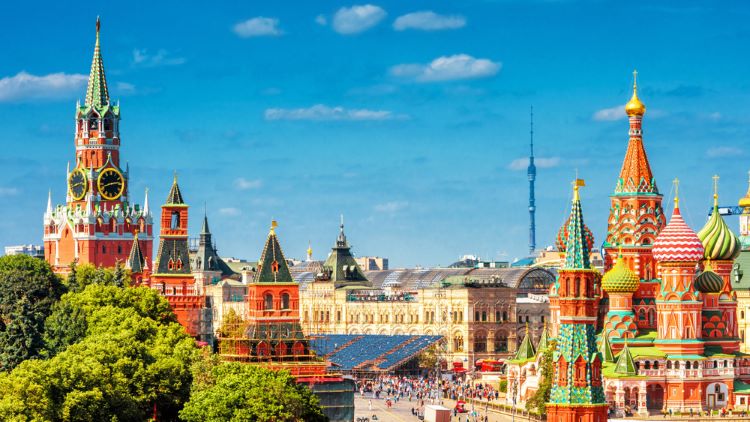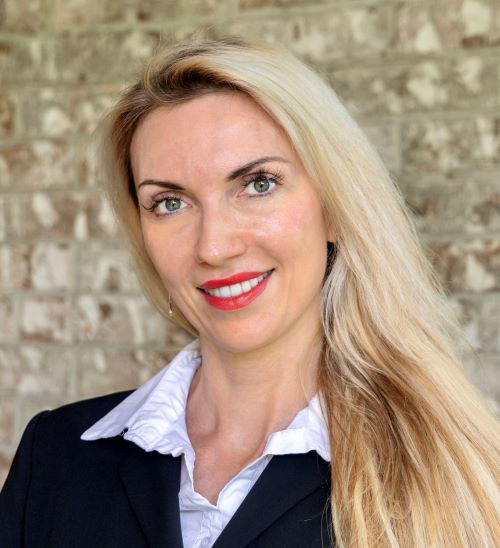Is there a way back for international law firms in Russia?

Moscow's Red Square with the Kremlin, left, and St. Basil's Cathedral. Image from Shutterstock.
With pressure mounting on Western companies after Russia’s invasion of Ukraine, some law firms realized they needed to do more than just part ways with clients and decided to wind down operations in the country altogether.
The mass exodus has included the corporate giants McDonald’s, Starbucks, Netflix and Google, who have either announced they would leave or suspend business. But at least 25 international law firms have also said they plan to hit the off-ramp.
Many of those firms announced they would close their Russia offices and exit the country. In March, Allen & Overy said it was winding down its Moscow office and would try to place 55 of its colleagues in other offices. Morgan Lewis announced that it would cease operations, and lawyers working in Moscow would be shifted to other regions.
But others—including giants Dentons, DLA Piper, Baker McKenzie and Clifford Chance—are taking a different approach.
In April, Clifford Chance said it was closing its office in Moscow and shifting all its Russian work to a new independent firm, Bortkevicha & Partners, which will be led by the managing partner of Clifford Chance’s office in Moscow. It said it also planned to relocate other members of its team to the new firm but says redundancies are expected.
And in March, Dentons announced it would spin off its Moscow and St. Petersburg offices into an independent firm. In a statement, the firm’s global CEO Elliott Portnoy said the exit was orchestrated with the firm’s Russian colleagues to meet its legal and ethical obligations. DLA Piper and Baker McKenzie also left stand-alone firms behind.
“We have enjoyed more than 30 years of collaboration and friendship with our colleagues in Russia who bear no responsibility for this crisis nor for the circumstances that have led to this decision,” Portnoy said in prepared remarks. “Our hope is that at a future time we will be able to come back together when it is lawfully and practically possible to do so.” Portnoy declined a request for an interview.
But as the war rages in Ukraine and the West has ramped up economic sanctions and export controls, Oliver M. Krischik, a trade law attorney with the Washington, D.C., firm GKG Law, says many businesses are likely focused in the short term on compliance rather than eyeing a potential return.
“It’s hard to predict what any type of reentry would look like, even under ideal circumstances,” Krischik says.
Then there are Russian countersanctions and threats to penalize companies that have exited. In a May advisory to its clients, the law firm Gibson, Dunn & Crutcher warned international companies and firms leaving Russia to expect more in the way of economic retaliation.
Proposed countermeasures against exiting companies have been outlined in a proposed bill that could allow the government to take control of their assets and nationalize their property.
Moreover, allegations of war crimes and human rights abuses create a moral and ethical incentive for global companies and firms, says Josh Gerben, a trademark attorney and founder and principal of the firm Gerben Perrott in D.C. It’s possible firms and companies may not contemplate a return until there is regime change, he says.
“There’s an understanding that if you do business with Russia, you are turning your back on the atrocities that are happening,” Gerben says. “That is a really difficult place for companies to be if they’re going to be doing business in that country going forward.”
Law firms also have to factor in the colleagues they are leaving behind who are just caught up in the war, explains Andrea Al-Attar, a solo practitioner and former enforcement officer in the Enforcement Division of the Office of Foreign Assets Control and former section chief of its Licensing Division.
“At the end of the day, a company is based on relationships. Rebuilding those relationships can be one of the most difficult aspects,” Al-Attar says.
In April, Dentons spokeswoman Astrid Egerton-Vernon said that the firm’s two Russian offices will remain part of the Dentons Europe Region until they become an independent firm.
“Following the separation, the teams in Moscow and St. Petersburg will continue to serve the legal needs of clients in Russia under a new name and brand. We will collaborate on client work as permitted by applicable sanctions and internal policies,” Egerton-Vernon wrote.
Baker McKenzie spokesman John McGuinness said in an April 19 email that its firm’s spinoff is an “ongoing process.” It has 130 lawyers working in its Moscow and St. Petersburg offices.
In a statement, DLA Piper said after 17 years in Russia, it was winding down its operations and closing its offices in Moscow and St. Petersburg.
“Our intention is to transfer the Russian business to our team there,” the firm said on March 14.
All three law firms are organized as Swiss vereins. Under the verein business model, law firms typically have several partnerships or member firms within the broader partnership. And unlike a financially integrated model, such as an LLP, partnerships and member firms in a verein have regulatory and financial independence.
 Kristin Stark is principal at Fairfax Associates.
Kristin Stark is principal at Fairfax Associates.
Spinning off
Kristin Stark is principal at Fairfax Associates, which is based in D.C., California and London, and advises law firms on organizational strategy and structure. She says the Swiss verein model offers several advantages to firms that are spinning off.
“For the firm to spin off a partnership, there’s already a governance model for that partnership that has its own profit model and partnership agreement. It makes that cutting of ties much cleaner than when you’re in a financially integrated partnership,” Stark says.
Parting ways under a verein can be less unsettling for a firm’s employees and lawyers than breaking up a financially integrated partnership, which Stark likens to a divorce. And the model would allow those left behind to “preserve positive relationships with the larger partnership,” she says.
In theory, that could make it easier for firms to reunite. And that flexibility is “one of the reasons why vereins have grown so rapidly,” Stark says. She adds the model means firms don’t take on “as much structural and financial risk” in countries or regions of the world where there is economic and political instability.
But regardless of a law firm’s organizational structure, exiting from any country and leaving an independent firm behind is an “incredibly complicated exercise,” Stark adds, and there are downsides to any split.
Stark says one reason is because of the uncertainty it creates for clients. Given the circumstances, she believes they will be understanding. But the transition can be fraught, especially if an international law firm is leaving behind pending cases and clients used to working under one team and brand.
Exiting Russia will shift firms’ global strategies, and some could be considering whether or not to return, Stark says.
“It’s too early to determine whether or not that’s even a possibility,” Stark adds. “I think firms are uncertain about what the future holds.”
 Uliana Kozeychuk is an attorney who advises clients on Russian employment law issues for the international law firm Littler Mendelson.
Uliana Kozeychuk is an attorney who advises clients on Russian employment law issues for the international law firm Littler Mendelson.
Uliana Kozeychuk, an associate at Littler Mendelson based in Irvine, California, advises clients on Russian employment law issues. She says that under Russian law, law firms doing business in the country must register as either a field office of a foreign legal entity or register as a stand-alone Russian legal entity.
Kozeychuk says that from an employment law standpoint, exiting is complicated because of strictly mandated notice and severance requirements tied to redundancies and layoffs. In addition, registering a new Russian legal entity or a Russian limited liability company can be a drawn-out process that can take up to two years, she says.
But for firms that might be contemplating a return, the path back to the country should be simpler, Kozeychuk believes.
“I’m sure Russia would welcome them back with open arms because of extra tax revenue and jobs for Russian citizens. As much as there’s hostility now, I can’t imagine anybody being denied an opportunity to come back to Russia and do business there,” Kozeychuk says.
‘Profound change’
But as allegations of war crimes and human rights abuses stack up, will law firms ever have the appetite to do business in the country again?
Jeffrey A. Sonnenfeld, senior associate dean for leadership studies & Lester Crown professor in the practice of management at Yale School of Management, has been working with a team of researchers to track 1,000 companies, including law firms, that have curtailed operations in the country.
Several surveys suggest that Gen-Zers and Millennials are more likely to demand corporate social responsibility as consumers and employees. And Sonnenfeld says the managing partners he’s been talking to say younger lawyers have been vocal about the need to leave.
“It is their internal constituency of young lawyers that makes a big difference. That seems to be what’s driving it,” Sonnenfeld says.
“If they weren’t already deterred before, they will certainly be deterred now,” Gerben adds. “There aren’t going to be many U.S. companies that would even consider entering Russia, because they saw what happened, and they don’t know when it’ll happen again, and they’re not going to be willing to take that risk.”



